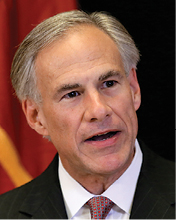
Greg Abbott, JD’84, was elected governor of our nation’s second most populous state Nov. 4. A Republican who currently serves as Texas attorney general, Abbott won by a wide margin against Democrat Wendy Davis.
Abbott, who succeeds Republican Rick Perry, will be the state’s first new governor in 14 years. In his victory speech Abbott urged Texans of both parties to work together for the state, stating the needs of Texas “are bigger than any political party.”
Originally from Wichita Falls, Texas, Abbott earned his undergraduate degree in business at the University of Texas before earning his law degree at Vanderbilt. After law school he and his wife, Cecilia, moved to Houston, where Abbott had accepted a position as an associate with Butler & Binion. Just two months later Abbott was jogging when a storm-damaged oak tree suddenly crashed down, crushing him and severing his spine.
Throughout his recovery, it was clear the freak accident would not stop Abbott. The Houston rehabilitation hospital where he was treated installed a second phone line in his room so he could work. In his victory speech Abbott proclaimed he was “living proof that a young man can have his life broken in half and still rise up to be governor of this great state.”
After beginning his career in private practice, Abbott served as a state trial judge starting in 1993, was appointed to the Texas Supreme Court by then-Gov. George W. Bush in 1996, and then was elected state attorney general in 2002.
Abbott’s record as Texas’ attorney general includes many high-profile cases and important enforcement actions. Early in his 12-year tenure, he established dedicated units to focus on online sexual predators and Medicaid fraud and made collecting delinquent child support a priority. In 2005 he filed suit against Sony BMG Music Entertainment, marking Texas as the first state in the nation to bring legal action against a company for installing illegal spyware on devices. He also famously defended the state’s Ten Commandments monument, which had stood on Texas’ capitol grounds for 40 years, winning a 5–4 victory before the U.S. Supreme Court.